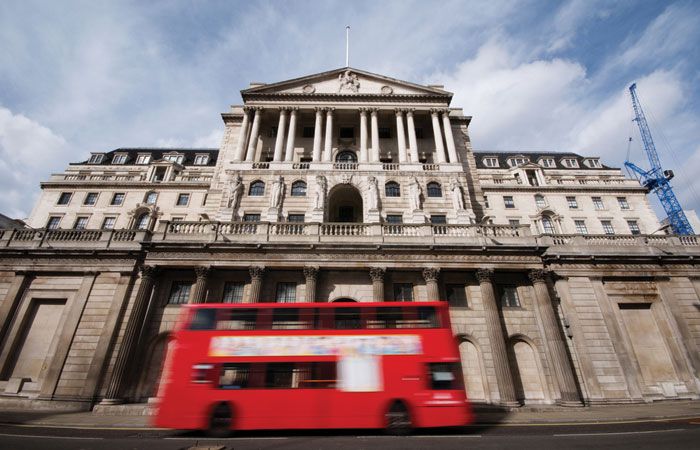The Bank of England’s Monetary Policy Committee (MPC) has voted through its fourteenth consecutive base rate rise today.
By increasing the base rate by 0.25% to 5.25% the MPC has taken the cost of borrowing to its highest rate since the financial crisis in 2008.
Most analysts predicted a 0.25% rise (rather than 0.5%) – so this rise is by no means a shock but it still represents is a 15-year record interest rate.
Just Mortgages national director Carl Parker says that even with the positive news on inflation last month, the general expectation was that the Bank of England would continue its rate rising agenda.
“Last week’s news from across the pond of the Fed increasing its headline rate – despite the fact inflation was just 3% – further cemented this view.
“Thankfully the MPC mirrored the Fed’s call with only a 0.25% rise, rather than repeating its bumper rise in June.
“The hope is that because this was very much expected, it won’t spook the markets which is the last thing anybody needs. Even with the wider volatility, we are beginning to see some really positive signs. News of lenders improving rates – if only marginally for now, and a rise in transactions in June are both incredibly encouraging”.
Phoebus Software chief revenue office Adam Oldfield agrees that today’s decision by the MPC will come as no surprise, but believes it will cause consternation for many borrowers.
“Whether it was the right decision is questionable, especially when we saw the first dip in inflation last month. Perhaps it would have been wiser to give the last rise more time to take affect? It will certainly be interesting to see the results of the upcoming review of the bank’s forecasting and procedures and how that may influence the members going forward”.
He adds: “Although there has been a spate of mortgage rate cuts recently, the general consensus will be that a base rate hike will surely mean an increase in mortgage interest rates. Hopefully, the speculation of an increase will have been enough for people to take stock and look at their mortgage affordability and current spending to prepare for a potential increase in mortgage payments”.
SPF Private Clients chief executive Mark Harris takes a similar line. “After 14 rate rises in as many meetings, it’s time for the Bank to press the pause button. Give this latest rate rise time to take effect and see how the markets react before deciding whether to continue with these rate increases. Consecutive rate rises have been painful; it’s time to let them do their job, rather than causing continued anxiety and distress for borrowers”.
Harris points out that those with a base-rate tracker will see their mortgage rate increase by 25 basis points. So a borrower with a £250,000 repayment mortgage on a 25-year term and a current pay rate of 4.5 per cent will see their monthly payments rise from £1,390 to £1,425.
Market Financial Solutions CEO Paresh Raja comments that the base rate now residing above 5% is not in itself a significant issue; as this was, of course, the norm before 2008.
“But the fact the jump up from a meagre 0.1% has come in a relatively short space of time (since December 2021) has offered borrowers, investors and businesses little time to adapt to higher rates”.
“Positively, looking ahead, economists are suggesting the base rate may not rise as high or as quickly as once thought, and the rates available on products are starting to reflect that. Today’s hike shows that – perhaps counter-intuitively for borrowers, even though the base rate rose, there is some good news in that the jump was smaller than previously predicted, allowing lenders to reassess their rates accordingly”.
He adds: “The market will realign to a higher base rate in due course, but today’s latest hike from the Bank of England reaffirms that lenders must double down on a proactive approach to supporting property owners and property buyers who will feel the effects of it.”
Shojin chief executive Jatin Ondhia believes it is more of the same for now, but there is a sense that we might be nearing the top of the interest rates mountain.
“Inflation is finally falling, with the next set of data on 16 August expected to show another notable decline. In turn, pressure will ease on the BoE, meaning it can slow or pause on its hiking of the base rate. All of this would allow for much-needed stability and hopefully a bit of confidence to return.
However, he adds: “We cannot underestimate the implications of elevated borrowing costs across the property market. Homeowners are facing higher mortgage rates than at any point since the financial crisis, while developers are also finding it harder to access finance.
“Consumers, investors and businesses will all be hoping that we are nearing the end of this economic turbulence – higher interest rates are here to stay, but we undoubtedly need to arrive at a point where the base rate is not continuously rising, giving everyone the chance to take more confident action where their money is concerned.”
ONP Group director Mark Tosetti raises the question: “What is the optimal inflation level required for economic stability, before the MPC can consider cutting interest rates?”
“There is a prevailing belief that interest rates may peak a little higher but confidence is growing that there will be a decrease further into the year. Only then will we see the much-needed certainty in the cost of borrowing and the return of stability for swap rates. This would then lead to an increased availability of products that better meet the needs of consumers.”







